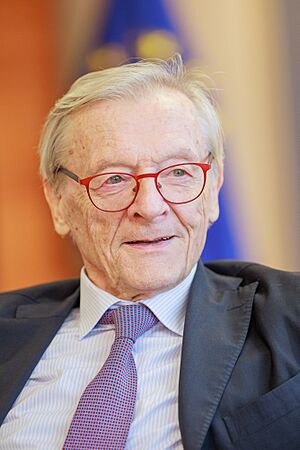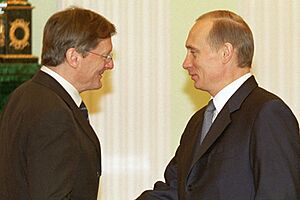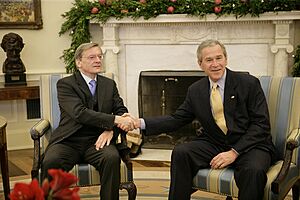Wolfgang Schüssel facts for kids
Quick facts for kids
Wolfgang Schüssel
|
|
|---|---|

Schüssel in 2024
|
|
| Chancellor of Austria | |
| In office 4 February 2000 – 11 January 2007 |
|
| President | Thomas Klestil Heinz Fischer |
| Vice-Chancellor | Susanne Riess-Passer Herbert Haupt Hubert Gorbach |
| Preceded by | Viktor Klima |
| Succeeded by | Alfred Gusenbauer |
| Vice-Chancellor of Austria | |
| In office 4 May 1995 – 4 February 2000 |
|
| Chancellor | Franz Vranitzky Viktor Klima |
| Preceded by | Erhard Busek |
| Succeeded by | Susanne Riess-Passer |
| Minister of Foreign Affairs | |
| In office 4 May 1995 – 4 February 2000 |
|
| Chancellor | Franz Vranitzky Viktor Klima |
| Preceded by | Alois Mock |
| Succeeded by | Benita Ferrero-Waldner |
| Minister of Economic Affairs | |
| In office 24 April 1989 – 4 May 1995 |
|
| Chancellor | Franz Vranitzky |
| Preceded by | Robert Graf |
| Succeeded by | Johannes Ditz |
| Personal details | |
| Born | 7 June 1945 Vienna, Austria |
| Political party | Austrian People's Party |
| Alma mater | University of Vienna |
Wolfgang Schüssel (born 7 June 1945) is a politician from Austria. He served as the Chancellor of Austria for two terms. This means he was the head of the Austrian government from February 2000 to January 2007.
Schüssel was known for trying to make big changes in Austrian politics. However, his governments also faced many challenges. This was partly because he formed a government with the Freedom Party of Austria (FPÖ). In 2011, he decided to step down from being an active member of parliament. This happened because of various investigations and issues related to his governments.
Contents
Early Life and Education
Wolfgang Schüssel was born in Vienna, the capital city of Austria. He went to a well-known Catholic school for boys called Schottengymnasium. There, he completed his final exams, called Matura, in 1963.
After school, he continued his studies at the University of Vienna. In 1968, he earned a special degree in law.
Starting His Political Career
Schüssel began his political journey working for the Austrian People's Party. From 1968 to 1975, he was a secretary for their group in parliament. Later, from 1975 to 1991, he became the general secretary of the Austrian Business Federation. This group is connected to the Austrian People's Party.
Becoming a Minister
On 24 April 1989, Wolfgang Schüssel became the Minister for Economic Affairs. He joined a government that was a "grand coalition." This means it was formed by two of Austria's largest political parties: the Social Democratic Party (SPÖ) and the Austrian People's Party (ÖVP). The government was led by Chancellor Franz Vranitzky.
In 1995, Schüssel became the leader of the Austrian People's Party. He also took on new roles in the government. On 4 May 1995, he became the Vice-Chancellor of Austria. At the same time, he became the Minister for Foreign Affairs. He kept these important jobs in the governments led by Chancellor Vranitzky and later by Chancellor Viktor Klima.
Serving as Chancellor of Austria
The First Schüssel Government (2000-2003)
In the 1999 election, Schüssel's party, the ÖVP, came in third place. After talks to form a government with the Social Democratic Party failed, Schüssel decided to work with the Freedom Party.
Wolfgang Schüssel became Chancellor on 4 February 2000. His government was the first in 30 years not to be led by the Social Democratic Party. This new government faced immediate challenges. Many people in Austria and other countries were concerned because the Freedom Party was part of the government.
International Reactions
Other countries, especially those in the European Union, were not happy with the new Austrian government. For several months, leaders from other countries showed their disapproval. They tried to avoid unnecessary meetings or interactions with the Austrian government. This was a way to show that they did not agree with the political choices made in Austria.
After some time, a group of important EU diplomats visited Austria. They looked at the situation and decided that the informal disapproval could be stopped. So, in the summer of 2000, things went back to normal between Austria and other EU countries.
The Second Schüssel Government (2003-2007)



By 2002, there were some disagreements within the Freedom Party. This led to early elections. In the 2002 election, Schüssel's party, the ÖVP, had its best result since 1983. They won 42.3% of the votes, becoming the largest party.
After talking with other parties, Schüssel decided to form a government again with the Freedom Party. On 28 February 2003, he was sworn in as Chancellor for a second time.
In 2005, the Freedom Party split into two groups. Even with this change, Schüssel continued his government until the next election. In the 2006 election, the ÖVP lost some votes and came in second place. Schüssel then served as a temporary Chancellor until a new government was formed on 11 January 2007.
President of the European Council (2006)
On 1 January 2006, Austria took over the role of leading the European Council. This means Wolfgang Schüssel, as Chancellor, became the President of the European Council for a period. He worked closely with other European leaders to guide the European Union's agenda during this time.
After Being Chancellor
After the 2006 election, Schüssel became the leader of his party's group in parliament. In 2008, he announced that he would continue to be a member of parliament but would not hold a leadership role.
In 2011, Wolfgang Schüssel decided to retire from parliament. This decision came amidst various challenges and investigations related to his time in government.
Government Policies
Wolfgang Schüssel's government tried to balance Austria's budget. They aimed for a "Nulldefizit," which means spending no more money than the government takes in. To do this, they raised some taxes and cut costs in other areas. For example, there were changes in the education system and the security sector.
However, Schüssel's government also increased spending in some areas. For instance, they introduced a new "Kindergeld" (child benefit) to help families. This replaced an older system and was a way to support families with children.
One big decision was to replace Austria's old fighter planes with new Eurofighter jets. The government argued that Austria needed to be able to defend its airspace. However, some people thought this was too expensive, especially when other areas were facing budget cuts.
The government also worked on pension reform. This was to prepare for a future where there would be more retired people than active workers. Schüssel's reforms aimed to make the pension system more stable for the long term. They also cut corporate tax to encourage businesses to invest and help the economy grow.
Life After Politics
Since retiring from Austrian politics, Wolfgang Schüssel has taken on various roles. He has served on the boards of several companies, like Investcorp and RWE. He was also on the board of directors for Lukoil and MTS for a few years.
He is also involved with many non-profit organizations. These include the Konrad Adenauer Foundation, United Europe, and the World Economic Forum. He works with groups that focus on foreign policy, European relations, and global leadership.
Awards and Honours
Wolfgang Schüssel has received many awards and honours from different countries. These show recognition for his work and contributions. Some of these include:
- 7 July 1995: Grand Cross of the Order of Isabella the Catholic (Spain)
- 1996: Grand Cross of the Royal Norwegian Order of Merit (Norway)
- 8 June 2000: Grand Cross with Diamonds of the Order of Merit of the Principality of Liechtenstein (Liechtenstein)
- 2004: Grand Cross of the Order of the Star of Romania (Romania)
- 2006: Grand Cross of Order of Merit of the Republic of Hungary (Hungary)
- 20 January 2006: Grand Cross of the Order of Merit of the Republic of Poland (Poland)
- 2007: Order of Merit of Baden-Württemberg (Germany)
- 2007: Bavarian Order of Merit (Germany)
- Honorary Citizen of Tirana, Albania.
See also
 In Spanish: Wolfgang Schüssel para niños
In Spanish: Wolfgang Schüssel para niños
 | Laphonza Butler |
 | Daisy Bates |
 | Elizabeth Piper Ensley |

